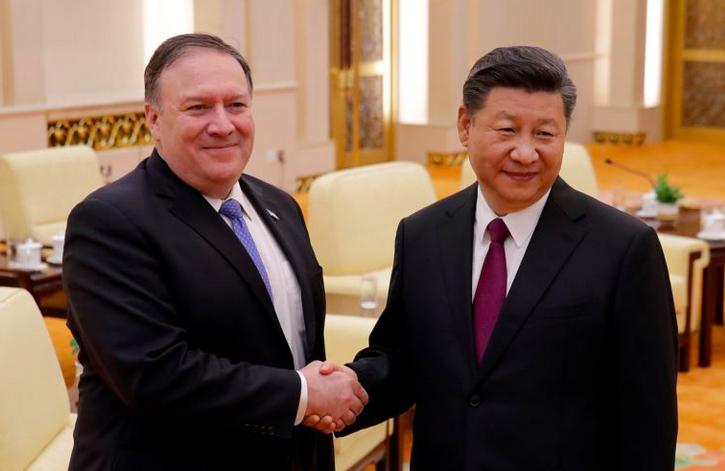Democracy Degradation and the Fait Accompli Factor
How the Trump administration has wrapped appeasement in denunciation to hand Hong Kong to Beijing.

Lisa Van Dusen
May 28, 2020
Of all the trends in politics and governance being led by democracy-degrading actors this year — in addition to the usual lying, bullying, and careening shamelessness — the one that may come to define 2020 is the use of the fait accompli gambit.
In the Sunday New York Times of Sept. 3, 1939, the lead Page 1 story was a dispatch by Hanson W. Baldwin headlined “Germany’s Hope Seen as the Fait Accompli.” The story reported German guns along the Vistula signalling “the start of what may turn out to be another world war,” and described Adolf Hitler’s reliance, not for the first time in his career, on the “strategy of the fait accompli.”
Like so many Hitlerian predilections — overweening megalomania, the depreciation of both life and death, the commodification of racism — the fait accompli as a strategic gambit has made a comeback lately among disruptive, destructive power players.
What was once—in geostrategic terms as opposed to the fait accompli of a doomed love affair or corporate ousting—a military manoeuvre designed to transform the status quo through overwhelming force and the element of surprise has, in the age of narrative warfare, been 2.0’ed as a manoeuvre designed to expedite outcomes through a combination of overwhelming ruthlessness and unyielding, weaponized guile.
The fait accompli strategy has been decoupled by technology — including surveillance, hacking, and viral propaganda — from Clausewitzian notions of war based on territory and material. It has also been detached from the notion of winning hearts and minds as a strategic imperative by practitioners who are using its latest model to destroy the system in which authentic public support is a requirement for governance.
The fait accompli in today’s terms is not produced by a seized port or a secured border, it’s sealed by the narrative catalyst of an election outcome, a previously unthinkable shock stunt or an authoritarian piece of legislation that rationalizes every anti-democracy development that comes after it. It did not surface as a tactic of the authoritarian puppet squad I like to call KAOS on Jan. 1, 2020 — the avoidable immolation of the Amazon rainforest under Jair Bolsonaro that was ignited last year certainly qualifies — but it’s been doubled-down on like a worst-case scenario in a sh*tstorm.
The fait accompli strategy in its post-internet, 21st -century version deploys propaganda to portray resistance as either destabilizing and reckless or, more subtly, admirable but futile. These days, the same corruption that produces that propaganda pre-emptively neutralizes obstacles to the fait being finagled in the fait accompli, whether it’s a stolen election, a genocidally mismanaged pandemic, the self-sabotaging truncation of Britain from the European Union, the unilateral annexation of the West Bank or the long-sought subjugation of Hong Kong. The ultimate propaganda goal is to produce the sense among those who might prove otherwise that “There is nothing more to be done.” (See Trump, D., entire presidency.)
Since this column was first published by the Hill Times 24 hours ago at re-posting time, U.S. Secretary of State Mike Pompeo has generated a quintessential fait accompli narrative drop. Following approval Thursday by China’s legislature of “a plan to suppress subversion, secession, terrorism and seemingly any acts that might threaten national security in the semiautonomous city,” per the New York Times, Pompeo issued a statement fit for the Fait Accompli Hall of Fame. “Today, I reported to Congress that Hong Kong is no longer autonomous from China, given facts on the ground,” he tweeted, adding with unmistakable irony, “The United States stands with the people of Hong Kong.”
The United States cannot stand with the people of Hong Kong while helping to obliterate their rights and freedoms and seal their fates. By legitimizing the end of Hong Kong’s autonomy from China as a fait accompli, Pompeo is also rationalizing the end of its special trading status with the U.S. and expediting the rise of Shanghai as Asia’s financial capital. That outcome, along with the transformation of Hong Kong into a post-democracy surveillance-state outpost, has been Beijing’s long-term goal.
Since, in modern warfare, whoever dominates the narrative controls the outcome, the only way to fight the fait accompli is to reclaim the plot with truth, transparency, principled dissent, and the kind of resistance that has seemed futile in asymmetrical dynamic after asymmetrical dynamic in previous wars against freedom, until suddenly it wasn’t.
Since Hong Kong’s fight isn’t just about democracy in Hong Kong but democracy everywhere, the Trump administration’s decision to validate and expedite Beijing’s fait accompli strategy while wrapping it in a denunciation is just appeasement couched in clumsy misdirection. Which, again, confirms whose side Donald Trump — who has arguably done more than Xi Jinping to degrade democracy — is really on in this global battle.
Lisa Van Dusen is associate editor of Policy Magazine and a columnist for The Hill Times. She was Washington bureau chief for Sun Media, international writer for Peter Jennings at ABC News, and an editor at AP in New York and UPI in Washington.
